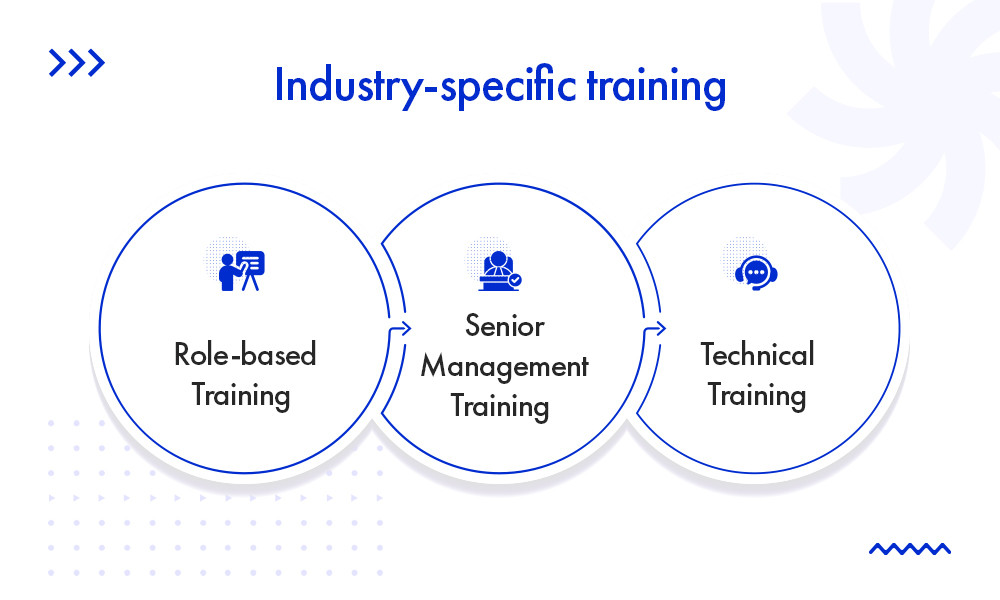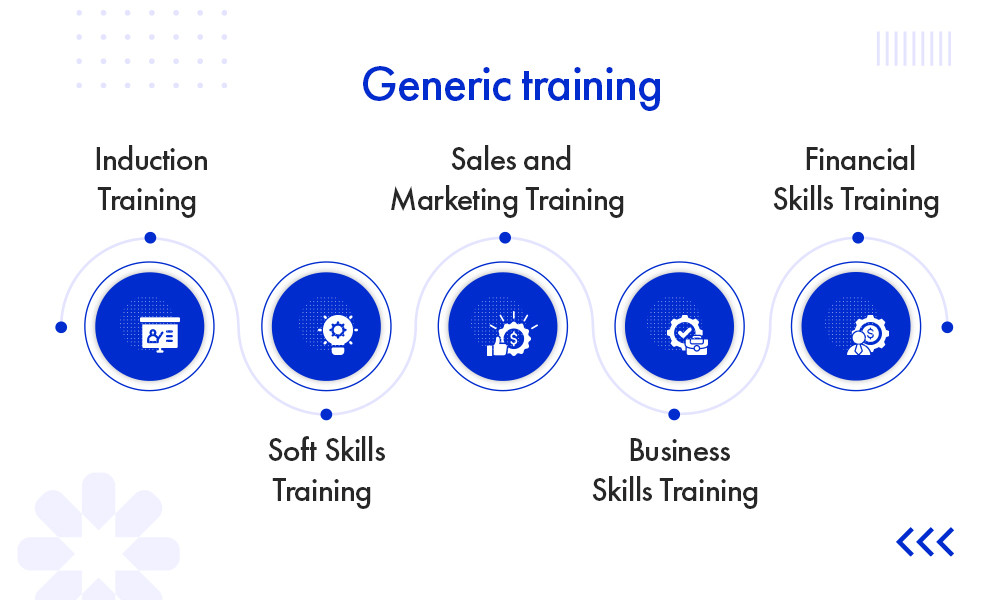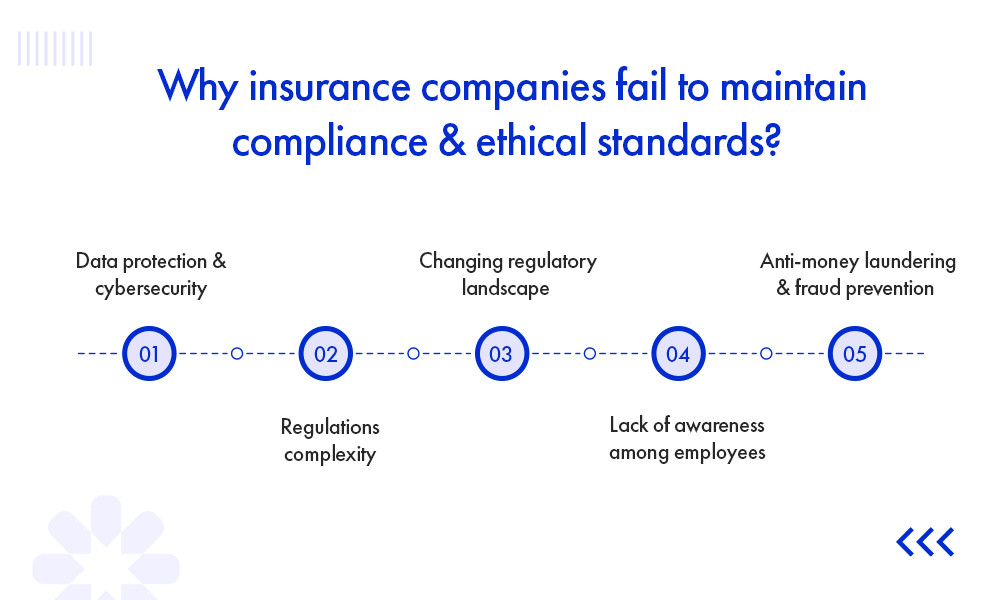In this ever-changing landscape with endless uncertainties, the insurance sector has always been a savior. From safeguarding our homes, health, and businesses, Insurance has always backed up with a reassured safety net.
- How to optimize training in the insurance sector?
- Overcoming compliance & ethics challenges with effective insurance training
- Key components of insurance training programs to maintain compliance & ethical standards
- How should I develop effective insurance training strategies to boost compliance and uphold ethical standards - Right?
- Implementing effective insurance training strategies – How to do it like a pro?
- Do you have an effective insurance training strategy in hand?
Agree or not?
However, with the evolving landscape, the Insurance sector is transforming too. Right from Claims Management to Underwriting, the approach has changed drastically. And the credit goes to the latest technologies - Artificial Intelligence, Data Analytics, and more.
Do you know what the output of this advancement is?
Increased customers’ expectations
To satisfy their potential customers' needs and maintain ethical standards and compliance, insurance professionals must equip themselves with the knowledge and skills to meet future challenges. And that’s where “Insurance Workforce Training” comes into the picture.
As soon as we hear "Training for insurance professionals," a myriad of questions strike our mind, including -
- What are the different types of insurance training programs that help to maintain compliance and ethical standards?
- What should be considered during insurance training?
- How can we conduct insurance workforce training programs?
- What are the benefits of insurance workforce training in enhancing compliance and ethical standards?
Do these questions sound like your thoughts? If yes, then we've got your back!
How to optimize training in the insurance sector?
Before we start with 'How to train your insurance workforce to enhance compliance and maintain data standards?' let's get a basic understanding of the different categories for insurance training. It is broadly divided into two distinct categories -


Now that you are well-versed with the two distinct categorizations for insurance training programs, it is time for ACTION.
So, let’s get started with knowing the most crucial elements that might ruin your insurance business’s success. Yes, we are talking about ‘Insurance Compliance Issues and Challenges.’
Overcoming compliance & ethics challenges with effective insurance training
No matter how diligent your preventive measures are, there comes a time when you will encounter Insurance compliance issues.
Reason?
Lack of effective insurance training strategies!

1. Data protection & cybersecurity
There is no denying that cybersecurity and data protection top the list when accessing compliance matters. Currently, the insurance sector is the prime target for cyber-attacks. Do you know the reason? Customers data. Due to a lack of cybersecurity and data protection, many insurance agencies fall into the trap of data breaches.
For Example: If you run a European Union-based Insurance business, you will be affected by GDPR. Also, there are ample legalities available when it comes to data breaches and cybersecurity. To resolve such issues, you should have started implementing the regulatory compliances, including -
|
2. Regulations complexity
The insurance sector has a long list of rules and regulations set forth by regulatory bodies. These regulations are often dense and subject to frequent amendments. Therefore, it becomes challenging for insurance professionals to stay abreast of all the requirements and maintain regulations timely.
| For Example: A small insurance agency is expanding its operations, but the team is unaware of the specific regulatory requirements in terms of policy issuance and claims processing. As a result, it will lead to unintentional violations of local regulations, which will harm the insurance agency's reputation. This is where professional insurance training programs come into the picture. |
3. Evolving regulatory landscape
Like any other industry, the insurance regulatory requirements keep evolving due to the changing market dynamics. Therefore, staying ahead of these changes requires continuous monitoring and adaptation to the upcoming rules and regulations, if any. If insurance agencies and companies do not adapt to the changing requirements, it might lead to major consequences.
For Example: You are running an insurance agency or organization where new laws require stronger protection of customer information. And, if your company doesn't quickly update its data security rules as per the new laws and regulations, it might accidentally expose private client data. Hence, conducting timely training for insurance professionals proves to be an added advantage for insurance firms. |
4. Lack of awareness among employees
Many employees within insurance companies lack a comprehensive understanding of compliance and ethical standards. Do you know what’s the reason behind it? Inadequate insurance workforce training, due to which they remain unaware of the latest insurance compliance rules and policies.
| For Example: Your insurance agency is aligned with the task of selling insurance policies to one of your employees. But, due to a lack of awareness regarding the ethical obligation, the agent may engage in misleading sales tactics. What will be the output? Exploited company reputation and eroded trust with customers. |
5. Anti-money laundering & fraud prevention
Guess the one sector where endless money transactions happen on a day-to-day basis? Yes, we are talking about INSURANCE. Be it SMBs or mid-scale, all the insurance companies are vulnerable to fraud and money laundering. Besides that, fraud detection is a significant issue that leads to huge financial losses for both policyholders and insurers.
For Example: Your insurance organization offers health insurance policies with the best investment options. However, no appropriate training is provided to the insurance agents. The agent unknowingly makes a policy purchase for a client. What will be the output? Increased risk of regulatory penalties for the Insurance company. Right? That’s exactly where insurance workforce training becomes the need of an hour. |
These are the five most common and major challenges faced by insurance agencies and businesses regarding compliance and data standards.
While knowing these challenges, what lesson did you get?
Insurance workforce training is must!
But wait! Before you jump right into conducting the insurance training programs, you must know how to do it. Effective insurance training strategies are essential to achieve perfection and success.
Key components of insurance training programs to maintain compliance & ethical standards
There are times when businesses conduct timely insurance workforce training programs, but still don’t get the desired outcomes.
Do you know what’s the reason or where they lack behind?
Let’s see what our Head of Insurance Domain has to say -
| "As an insurance industry veteran, I've noticed many agencies invest in workforce training programs and professional development, yet often fall short of their goals. The problem usually isn't the investment itself, but the approach.” - Bharat Lokchandani |
Successful training demands more than just implementation - it needs a strategic foundation and ongoing learning opportunities. When these two major elements are missing, even well-prepared training programs can fail. Therefore, Insurance organizations must re-evaluate their insurance training strategies to meet the evolving needs and demands of the insurance sector.
Now, you might be wondering -
How should I develop effective insurance training strategies to boost compliance and uphold ethical standards - Right?
Here are the approaches that could help -
Role-based insurance training
Plan customized insurance training sessions to match employees' specific roles and responsibilities. For instance, regulatory compliance training should be provided to sales agents, while claims adjusters might require training in claims management and processing.
Real-life scenarios & case studies
The research says the human mind remembers things better and longer when represented with visuals and relevant information. So, why not apply this theory to your insurance workforce training strategies? Offering real-life scenarios and case studies relevant to the insurance industry helps employees understand how to apply theoretical knowledge in practical situations. So, come up with case studies that could help them understand the insurance terms in a better way.
Interactive and engaging training methods/modules
Nobody likes to listen to boring lectures or attend long sessions. To be honest, nobody even remembers it. Therefore, coming up with interactive insurance-oriented workshops and group discussions makes learning more interesting and memorable. Interactive training encourages participation and fosters a deeper understanding of ensuring compliance and ethical standards.
Industry-specific & refresher courses
Given the evolving nature of regulations and industry practices, provide refresher courses and industry-specific training based on life insurance, property and casualty (P&C), health insurance, and more. This ensures that employees stay informed about changes in compliance requirements and reinforces their knowledge over time.
Assessment and feedback mechanisms
Besides focusing on training your insurance employees or workforce, getting feedback from them is a must. Now comes the question: how??? That's where assessment tools, including quizzes or exams, can be your savior. It allows insurance companies/agencies to evaluate employees' viewpoints. Additionally, providing feedback on employee performance helps them understand their strengths. Also, they can work on areas that need improvement, facilitating personal development in insurance.
But this isn’t limited to insurance.
We even keep asking our clients for their potential feedback so that we can improve on the areas where we lack.
Take a glimpse at how we do it! -

These are the major life-savior components in the insurance sector that could help businesses climb the ladder of success.
You could be the next one!!!
Now that you know -
- Compliance and ethical standards in insurance
- Major challenges for maintaining compliance and ethical standards
- Key components of effective insurance training strategies
Guess what’s next >> Finally, it is time to implement effective insurance training programs focused on maintaining compliance and ethical standards.
Implementing effective insurance training strategies – How to do it like a pro?
Finally, you are one step closer to implementing insurance training strategies and achieving more business efficiency and success in no time.
Let's get started..
1. Employee gap analysis training & needs assessment
Before you design an insurance training program, conduct a needs assessment and gap analysis to understand where your employees are lacking behind. The process involves identifying specific areas where employees need more training. Afterward, you can tailor the insurance training strategies to effectively address the issues or challenges.
| Real-life scenario – Conducting needs or gap analysis assessments for claims processing staff can help you discover whether they require additional training, as per the recent changes to insurance laws and regulations. |
2. Designing training modules and materials
Now that you have the results in hand. What's next? Well, it is high time to design the training modules and materials that are easy to understand. Make sure to cover all the crucial topics, including the guidelines, insurance best practices, regulatory requirements, and more.| Real-life scenario – If you are preparing a training module or material for underwriters, don’t forget to include case studies, interactive e-learning modules, or real-life scenarios for a better understanding. |
3. Incorporate multiple training delivery methods
It is time for some action. For better results, incorporate different training methods, such as in-person sessions, online courses, and blended learning approaches for the best outcome. You might be wondering how to choose the best training delivery method. Right? Well, you can consider multiple factors, including -
- Organization's size
- Employees Geographic Distribution
- Training content
| Real-life scenario – In-person training will work best if you are training on some complex topics. For generic topic-oriented information, online courses will help employees get training on their own. |
4. Employee progress monitoring and evaluation
There are a lot of insurance agencies and businesses that give appropriate training to their employees, but their team still fails. Do you know why? Because the businesses do not monitor and evaluate their employee's effectiveness regularly. Everything needs to be tracked after insurance training programs, from tracking employee knowledge retention to employee engagement and knowledge retention.
| Real-life scenario – Insurance companies can circulate feedback surveys to get valuable feedback on the quality of training materials and delivery methods. Post-training assessments can also be used to evaluate employees' understanding of that topic. |
5. Continuous improvement
None of the training strategies are perfect, no matter how much effort you put into it. With the changing times, new things come up; hence, every strategy needs to be modified to keep up with the pace. Hence, every insurance company must continuously improve their insurance training efforts.
| Real-life scenario – You have prepared a training module for your employees, but they find it difficult to understand. So, it is a must for the company to revise the training materials to improve clarity and relevance. On the other hand, if there is an addition to the existing rules and regulations, your training programs should be updated accordingly to ensure compliance. |
We hope now you got an answer to your major query - “How to implement insurance training strategies effectively?”
Each step mentioned above will take your insurance business one step closer to business success and perfection. In addition to implement these insurance training steps; industry leaders can also improve insurance workforce training by -
- Switching from traditional instructor-led training to online learning
- Integrating learner-focused strategies
- Choosing a dynamic learning & performance ecosystem
- Thinking beyond a formal insurance training approach
Do you have an effective insurance training strategy in hand?
No organization can comply with the changing rules and regulations overnight! Hence, effective insurance training strategies are required to empower your workforce with the right skills and knowledge. Whether you are a well-known insurance agency running for a long time or have recently entered the insurance realm, investing in insurance training programs helps to maintain compliance and ethical standards. Now you have the strategies in hand, leverage them into your insurance process, as ensuring corporate compliance is the key to success. So, it is time to take one step ahead.
FBSPL, a leading insurance outsourcing solutions provider always believes in investing both employees and its potential clients. We believe that education serves as the steppingstone to ensuring business success and growth. Our commitment to offering extensive training programs, sessions, workshops, and more underscores our dedication to this belief. It is for this reason that every client partnered with us has experienced the significant growth and success they truly deserve.





